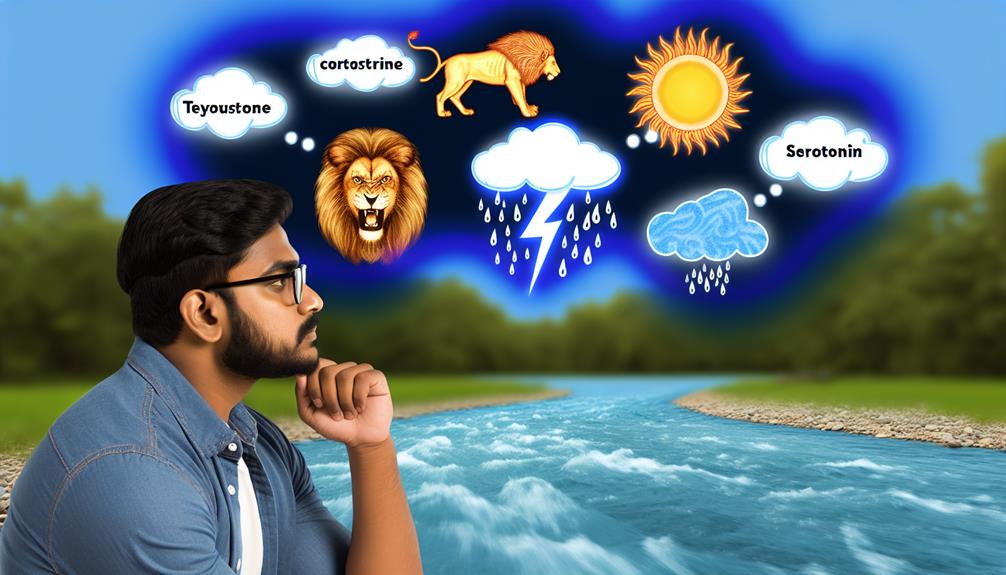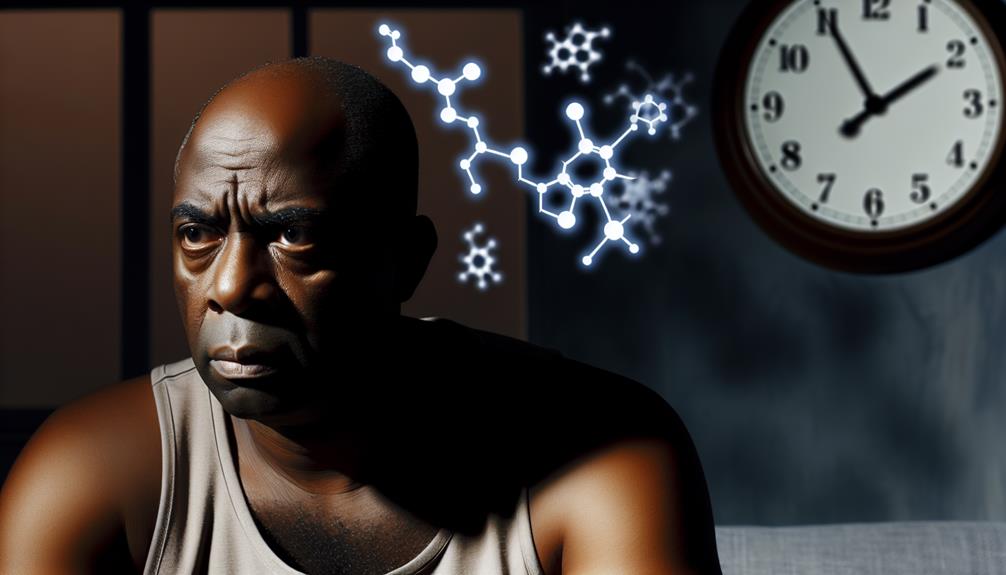Hormones play an important role in shaping men's mood and mental health. Low testosterone can lead to irritability, fatigue, and even depression, while elevated cortisol levels are associated with anxiety and mood swings. I've found that proper hormone balance is essential for emotional stability. Surprisingly, estrogen also influences mood, and imbalances can exacerbate emotional issues. Effective lifestyle choices, like regular exercise and a healthy diet, can help regulate these hormones. Understanding these interactions is significant for managing emotional well-being, and if you're curious about the specifics, there's much more to uncover.
Overview of Hormones in Men

When we explore the domain of hormones in men, it's essential to understand their dual role in both physical and emotional health. Men produce a complex array of hormones, each playing a significant part in maintaining the body's equilibrium. The primary players include testosterone, cortisol, and estrogen, among others. These hormones don't act in isolation; rather, they engage in intricate hormonal interactions that can greatly influence mood and behavior.
The endocrine function of these hormones is critical for regulating various bodily processes. For instance, testosterone is often associated with energy levels and mood stabilization. Low testosterone levels can lead to feelings of fatigue, irritability, and even depression. On the other hand, cortisol, the stress hormone, can wreak havoc on mental well-being when produced in excess, contributing to anxiety and mood swings.
Additionally, estrogen, which is often overlooked in men, also plays a role in emotional health. While typically associated with female biology, men do produce estrogen, and it's essential for mood regulation. Imbalances in these hormones can lead to emotional dysregulation, affecting relationships, work performance, and overall quality of life.
The Role of Testosterone
Testosterone plays a pivotal role in shaping not only a man's physical attributes but also his emotional landscape. It's fascinating to reflect on how this hormone influences mood regulation, impacting everything from energy levels to emotional resilience. I've often seen how men with declining testosterone levels report feelings of irritability, fatigue, and even depression.
In my observations, testosterone therapy can be a game-changer for many. When administered properly, it often leads to significant improvements in mood and overall well-being. For instance, men who undergo testosterone replacement therapy frequently report enhanced mood stability, increased motivation, and a more positive outlook on life. This connection between testosterone and mood regulation cannot be overstated; it underlines the importance of maintaining balanced hormone levels for psychological health.
However, it's essential to approach testosterone therapy with caution and under professional guidance. Not everyone will require treatment, and improper use can lead to adverse effects. What I find particularly interesting is the intricate balance that testosterone must maintain with other hormones in the body. An overabundance or deficiency can destabilize not just mood, but overall health.
Impact of Cortisol Levels

Cortisol, often dubbed the "stress hormone," plays an essential role in how men experience and manage their moods. Elevated cortisol levels can lead to a variety of cortisol effects that greatly impact mental health. When I experience prolonged stress, my body releases more cortisol, which can create a vicious cycle of anxiety, irritability, and even depression. Understanding this relationship is vital for effective stress management.
Here's a quick breakdown of how cortisol levels can affect mood:
| Cortisol Level | Mood Effects | Stress Management Tips |
|---|---|---|
| Low | Calm, relaxed | Regular exercise, meditation |
| Normal | Balanced, focused | Healthy diet, adequate sleep |
| Elevated | Anxiety, irritability | Mindfulness, breathing exercises |
| Chronic High | Depression, fatigue | Seek professional help, therapy |
When cortisol levels are consistently high, it can lead to chronic stress, which is detrimental to mental health. I've found that engaging in regular physical activity and practicing mindfulness techniques can help lower cortisol levels, thereby improving my mood overall.
It's worth noting that managing stress effectively is not just about reducing cortisol; it's about creating a balanced lifestyle. Recognizing the impact of cortisol on my mood has empowered me to take proactive steps toward better mental health. By understanding these cortisol effects and implementing stress management strategies, I can foster a more positive emotional state.
Estrogen's Influence on Mood
Although often associated with female biology, estrogen also plays a significant role in men's mood regulation. Many might be surprised to learn that men have estrogen receptors in their brains, which suggests that this hormone isn't just a female concern. These receptors are vital for modulating various emotional responses, influencing how we experience and express our feelings.
Research indicates that estrogen can enhance emotional sensitivity in men. This means that when estrogen levels are balanced, it may help men process emotions more effectively, leading to improved mood stability and resilience. However, fluctuations in estrogen can lead to heightened emotional reactivity, which might manifest as irritability or mood swings.
It's essential to recognize that the balance of hormones, including estrogen, is fundamental for mental wellbeing. For instance, when estrogen levels drop, perhaps due to aging or other factors, men might experience an increase in depressive symptoms or anxiety. In contrast, when levels are ideal, men may find themselves better equipped to handle stress and maintain a positive outlook.
Understanding estrogen's influence on mood can provide valuable insights into how emotional health is interconnected with hormonal levels. By acknowledging the role of estrogen in men's mental health, we can better appreciate the complexity of emotional experiences and the importance of maintaining hormonal balance for overall wellbeing. So, next time you think about hormones and mood, don't overlook the significant impact that estrogen can have.
Hormonal Imbalances Explained

When discussing hormonal imbalances, it's essential to understand how these disruptions can impact mood and overall mental health. The endocrine system plays a significant role in regulating hormones, which are chemical messengers that influence various bodily functions, including mood regulation. When hormonal feedback mechanisms fail, it can lead to imbalances that affect mental well-being.
For instance, if the body produces too much or too little of certain hormones, such as testosterone or cortisol, it can disrupt the delicate balance necessary for emotional stability. Testosterone is often associated with assertiveness and mood enhancement, while cortisol, known as the stress hormone, can lead to feelings of anxiety and depression when levels are consistently high.
In my experience, recognizing these hormonal fluctuations is important for understanding their impact on mental health. For example, during times of stress or significant life changes, the body may experience elevated cortisol levels, which can contribute to irritability and mood swings. Conversely, low testosterone levels can lead to a sense of fatigue or a lack of motivation, further complicating one's emotional state.
Symptoms of Hormonal Changes
Hormonal changes often manifest through a range of symptoms that can greatly affect a man's mood and overall well-being. As I navigate through these fluctuations, I've come to realize that it's essential to recognize the signs. Having a symptoms checklist can be invaluable in identifying when things might be off-balance.
Here are four common symptoms I've noticed:
- Mood Swings: One of the most apparent signs is experiencing sudden shifts in mood. I might feel elated one moment and irritable the next, often without any clear trigger.
- Fatigue: Persistent tiredness can creep in, making it hard to focus or engage in daily activities. I find myself craving more rest, which can contribute to a downward spiral in mood.
- Decreased Libido: A drop in sex drive is another symptom that can be quite distressing. I've learned that this isn't just a physical change, but it often affects my mental state as well.
- Anxiety and Irritability: Increased feelings of anxiety and irritability can manifest, creating a sense of unease. I often feel on edge, which can strain relationships and personal happiness.
Recognizing these symptoms helps me take proactive steps towards addressing them. Hormonal changes can be subtle but understanding this symptoms checklist allows me to maintain my mental health effectively.
Effects of Aging on Hormones

As men age, it's common to experience a gradual decline in testosterone levels, which can greatly influence mood and overall mental wellness. This hormonal shift often leads to imbalances that may contribute to feelings of irritability or depression. Understanding these changes is essential for addressing the challenges many face in maintaining emotional health as they grow older.
Testosterone Decline Over Time
Over the years, men often experience a gradual decline in testosterone levels, which can considerably impact their mood and overall well-being. This decline is part of age-related changes and can lead to various psychological effects, including mood swings and decreased mental resilience. Understanding these shifts can help in addressing the resulting challenges.
Here are some key considerations:
- Testosterone Therapy: For some men, testosterone therapy can provide a means to counteract the effects of declining hormone levels, potentially improving mood stabilization.
- Hormone Replacement: This approach should be carefully monitored, as it may come with risks and side effects that need to be managed.
- Lifestyle Modifications: Engaging in regular exercise, maintaining a balanced diet, and managing stress can positively influence hormone levels and overall mental health.
- Age Related Changes: Recognizing that these changes are normal can help men approach them with a proactive mindset, fostering better emotional health.
Hormonal Imbalance and Mood
Experiencing hormonal imbalances can greatly influence a man's mood and emotional health, particularly as he ages. As I investigate the connection between hormonal fluctuations and mood, I can't help but notice how these changes can lead to mood swings and disrupt emotional stability. With age, the body undergoes various biological rhythms that can affect testosterone and other hormone levels, which in turn impacts mood regulation.
The psychological effects of these hormonal changes can be significant. For instance, increased stress responses may elevate anxiety levels, making it difficult to cope with daily challenges. This heightened state of stress can act as a depression trigger, leading to mood disorders that affect overall well-being.
Moreover, understanding that hormonal imbalances can create a cycle of emotional distress is essential. As hormones fluctuate, they can exacerbate existing issues or create new ones, making it important for men to monitor their emotional health as they age. Recognizing these patterns can help in seeking appropriate support and interventions, ultimately fostering better mental health in the face of aging.
Aging and Mental Wellness
The interplay between aging and mental wellness is profoundly influenced by hormonal changes that occur as men grow older. I've noticed how these shifts can affect various aspects of our lives, particularly cognitive function and emotional resilience. As testosterone levels decline, it can lead to challenges in maintaining brain health and emotional stability.
Here are four critical factors to reflect on:
- Lifestyle Factors: Regular exercise and healthy eating can counteract some hormonal effects, enhancing mood and cognitive function.
- Sleep Quality: Aging often disrupts sleep patterns, which greatly impacts mental wellness. Prioritizing good sleep hygiene is essential.
- Social Connections: Maintaining strong relationships helps foster emotional resilience. Engaging with friends and family can buffer against stress and depression.
- Mindfulness Practices: Incorporating mindfulness and stress management techniques can improve mental clarity and overall well-being.
Additionally, exploring therapy options and self-care strategies can further support mental health. By being proactive in these areas, we can navigate the challenges of aging while enhancing our mental wellness.
Stress and Hormonal Fluctuations
Stress can greatly alter hormonal balance, impacting mood in ways that are often overlooked. When I experience stress, my body initiates a cascade of hormonal responses, primarily involving cortisol, the stress hormone. Elevated cortisol levels can lead to a variety of emotional disturbances, such as anxiety and irritability. This is because cortisol not only affects the body's physiological functions but also influences neurotransmitters that regulate mood.
In my journey to understand stress management, I've learned that maintaining hormonal balance is essential for mental health. Chronic stress can disrupt the delicate interplay between hormones, leading to imbalances that exacerbate feelings of sadness or frustration. For instance, prolonged exposure to stress may lower testosterone levels, which are crucial for mood stability and overall well-being in men.
It's essential to recognize the signs of stress and implement effective stress management techniques. Whether it's through regular physical activity, mindfulness practices, or establishing healthy sleep patterns, these strategies can help mitigate the adverse effects of stress on hormonal balance. By prioritizing stress management, I can foster a healthier hormonal environment, which in turn supports a more stable mood.
Nutrition's Role in Hormonal Health

Many people underestimate the profound impact nutrition has on hormonal health. I've found that what we eat can greatly influence our hormone levels and overall mental well-being. A balanced diet not only provides essential nutrients but can also help mitigate issues like micronutrient deficiencies that may disrupt hormonal balance.
Here are four key aspects to take into account for ideal hormonal health:
- Omega 3 Fatty Acids: Incorporating sources like fish or chia seeds can support hormone production and reduce inflammation, which is essential for mood regulation.
- Gut Health: A healthy gut microbiome plays a significant role in hormone balance. Consuming fiber-rich foods, such as legumes and whole grains, can promote the growth of beneficial bacteria that help with hormone metabolism.
- Meal Timing: Eating at consistent times can stabilize blood sugar levels, reducing cortisol spikes that may negatively affect mood.
- Hydration Levels: Staying properly hydrated is critical for maintaining energy levels and cognitive function, both of which are influenced by hormonal health.
Lastly, I can't stress enough the importance of moderating sugar intake and choosing high-quality protein sources, as these choices directly impact your hormonal balance. Reflecting on plant-based diets can also provide a wealth of nutrients that support hormonal health. By paying attention to these nutritional factors, we can foster a more balanced hormonal environment, ultimately enhancing our mental health and well-being.
Exercise and Mental Well-Being
I've often noticed how physical activity can greatly enhance mood and overall mental well-being. Exercise not only boosts endorphins but also plays an essential role in regulating hormones that help manage stress. Understanding this connection can empower us to make informed choices about incorporating regular exercise into our routines for better mental health.
Physical Activity Benefits
Physical activity serves as a powerful tool for enhancing mental well-being, particularly in men. Engaging in regular physical activities can greatly uplift mood and improve overall mental health. Here are some key workout benefits I've found through my own experiences:
- Endorphin Release: Cardio exercises and strength training trigger the release of endorphins, which are natural mood lifters.
- Structured Routines: Following exercise routines or fitness programs creates a sense of accomplishment, boosting self-esteem and confidence.
- Social Interaction: Participating in group sports or outdoor activities fosters connections with others, reducing feelings of isolation.
- Stress Reduction: Movement therapy, including activities like yoga or Pilates, helps to calm the mind and alleviate anxiety.
Adopting an active lifestyle not only enhances physical health but also provides psychological resilience. I've noticed that integrating various physical activities into my week—whether it's a brisk walk, a challenging workout, or a team sport—has made a profound difference in my mental clarity and emotional stability. By prioritizing these aspects, we can better navigate the challenges life throws our way.
Hormones and Stress Relief
Regular exercise not only boosts mood through physical benefits but also plays a significant role in hormonal regulation, particularly in managing stress. Engaging in regular physical activity triggers the release of endorphins, which are hormones that act as natural painkillers and mood elevators. This hormonal shift helps mitigate feelings of anxiety and depression, contributing to a more balanced emotional state.
To better understand the connection between exercise and hormonal balance, I've outlined a simple comparison of key hormones involved in stress management:
| Hormone | Role in Stress Management |
|---|---|
| Cortisol | Helps regulate stress response, but high levels can lead to anxiety. |
| Testosterone | Low levels can contribute to increased stress and mood swings. |
| Serotonin | Enhances mood and promotes feelings of well-being. |
| Endorphins | Act as natural pain relievers and elevate mood during and after exercise. |
Incorporating practices like hormonal meditation alongside exercise can further enhance stress relief. By focusing on breath and mindfulness, I've found that it complements physical activity, leading to a holistic approach to stress management and improved mental well-being.
Seeking Professional Help

Maneuvering the complexities of mood disorders can often feel overwhelming, but seeking professional help is an essential step toward understanding and managing these challenges. I've found that accessing the right resources can make a significant difference in my emotional well-being. Here are four key areas to contemplate when seeking help:
- Therapy Options: Various therapy modalities, such as cognitive-behavioral therapy (CBT) or psychodynamic therapy, can provide valuable insights and coping strategies for managing mood disorders.
- Counseling Services: Engaging with a licensed counselor can help in developing emotional regulation skills. They offer a safe space to explore feelings and develop tailored coping strategies.
- Medication Management: For some, medication can be an effective tool in stabilizing mood swings. Working closely with a psychiatrist guarantees that medication aligns with individual hormonal fluctuations and overall mental health needs.
- Support Groups: Connecting with others who face similar challenges can be incredibly validating. Support groups provide a sense of community and shared experience, which can foster resilience.
In addition, integrating mindfulness techniques into my daily routine has proven beneficial. These practices, along with lifestyle coaching, can enhance emotional regulation and overall mental health. Remember, reaching out for help is a sign of strength, and it's okay to seek guidance as you navigate the complexities of mental health.
Lifestyle Changes for Balance
When I consider lifestyle changes that can promote hormonal balance, exercise and nutrition immediately come to mind. Regular physical activity not only boosts mood but also helps regulate hormones, while a balanced diet provides the essential nutrients necessary for ideal hormone function. By making intentional choices in these areas, we can greatly improve our overall well-being and emotional stability.
Exercise and Mood Enhancement
Many men underestimate the profound impact exercise can have on mood regulation and overall emotional well-being. Regular physical activity isn't just about building muscle or losing weight; it's a powerful tool for enhancing mood. I've found that incorporating both cardio and resistance training into my routine can lead to significant improvements in how I feel.
Here are some key benefits I've observed:
- Endorphin Release: Engaging in cardio workouts stimulates the release of endorphins, which can elevate mood and reduce feelings of depression.
- Stress Reduction: Resistance training not only strengthens the body but also helps lower cortisol levels, leading to a calmer state of mind.
- Increased Self-Esteem: Achieving fitness goals, whether through lifting heavier weights or completing a challenging run, boosts self-confidence and overall mental health.
- Social Interaction: Group workouts or team sports provide valuable social support, which is essential for emotional stability.
Incorporating exercise into my lifestyle has shown me that the benefits extend far beyond physical health. It's a significant component of maintaining emotional balance and resilience in today's fast-paced world.
Nutrition's Role in Balance
While exercise plays an essential role in emotional health, nutrition also greatly influences mood and hormonal balance. I've learned that understanding nutrient timing can optimize the effects of my meals on my mood. For instance, consuming omega-3 fatty acids—found in fish or flaxseeds—can support brain health and reduce anxiety.
Meal frequency is another crucial aspect; spreading meals throughout the day can stabilize blood sugar levels, enhancing my mood and energy. I focus on my protein sources, ensuring they're varied, which helps regulate hormones that impact mental well-being.
Moreover, I pay close attention to micronutrient intake, as vitamins and minerals from whole foods can considerably affect mood regulation. I've found that incorporating dietary supplements, when necessary, can fill gaps in my nutrition, but they shouldn't replace whole foods.
Hydration levels also play an essential role; even mild dehydration can lead to mood swings. Meal planning has become a staple in my routine, allowing me to make informed food choices that support my gut health, ultimately contributing to a more balanced emotional state. By prioritizing these nutritional strategies, I notice a tangible difference in my mood and overall mental health.
Future Research Directions

As we look ahead to future research directions in the domain of hormones and men's mood, it's essential to take into account how various hormonal fluctuations might interact with psychological factors. The interplay between hormones and mood regulation is complex, and I believe focusing on several key areas can enhance our understanding and lead to effective interventions.
- Biomarker Research: Identifying specific biomarkers related to hormonal changes can help us better understand how these fluctuations affect mood. This could pave the way for targeted therapeutic interventions.
- Longitudinal Studies: Conducting long-term studies will allow researchers to observe how hormonal changes over time correlate with mood disorders, particularly in relation to age-related studies.
- Genetic Influences: Exploring the genetic factors that predispose individuals to hormonal imbalances could shed light on why some men experience more significant mood disruptions than others.
- Neuroendocrine Pathways: Investigating the neuroendocrine pathways involved in mood regulation may reveal new targets for hormonal therapies and lifestyle interventions that can improve mental health.
Frequently Asked Questions
Can Hormonal Changes Affect Men's Sexual Health and Libido?
Isn't it fascinating how our bodies can change so dramatically? Yes, hormonal changes can greatly affect men's sexual health and libido. I've noticed that testosterone fluctuations can lead to libido variations, influencing desire and performance. Furthermore, the estrogen impact shouldn't be overlooked, as it also plays a role. For those struggling, hormonal therapies might help restore balance, providing relief and enhancing sexual health. Understanding these dynamics is essential for overall well-being.
How Do Sleep Patterns Influence Hormone Levels and Mood?
I've noticed that sleep patterns greatly influence hormone levels and mood. Sleep deprivation disrupts my circadian rhythm, leading to hormone fluctuations that can exacerbate mood disorders. For instance, inadequate sleep can lower serotonin and increase cortisol, making me feel more anxious or irritable. Understanding this connection helps me prioritize rest, as I recognize that a good night's sleep isn't just essential for energy, but also for maintaining emotional balance and overall well-being.
Are There Specific Diets That Help Stabilize Hormones in Men?
When it comes to stabilizing hormones, it's like finding the right puzzle pieces. I've noticed that incorporating omega 3 benefits into my meals and timing nutrients effectively can really help. Additionally, plant-based diets have shown promise, while keeping an eye on sugar intake and alcohol effects is essential. Testosterone boosters can also play a role, but balance is key. A thoughtful approach can make a significant difference in overall well-being.
What Role Do Genetics Play in Hormonal Mood Swings?
I've often wondered about the role genetics plays in hormonal mood swings. It turns out that our genetic predisposition can markedly influence hormone regulation. Variations in certain genes may affect how our bodies produce and manage hormones, leading to fluctuations in mood. Understanding this connection can be essential for those of us experiencing mood swings, as it highlights the importance of both genetic factors and lifestyle choices in maintaining emotional balance.
How Can Mindfulness Practices Impact Hormonal Balance and Mental Health?
I've found that mindfulness meditation greatly impacts hormonal balance and mental health. By practicing mindfulness, I experience stress reduction, which helps lower cortisol levels. This decrease in stress hormones can lead to improved mood and emotional well-being. Additionally, regular mindfulness can enhance self-awareness, allowing me to recognize and manage my feelings better. Overall, integrating mindfulness into my routine has been a valuable tool for achieving a more balanced mental state and healthier hormone levels.
